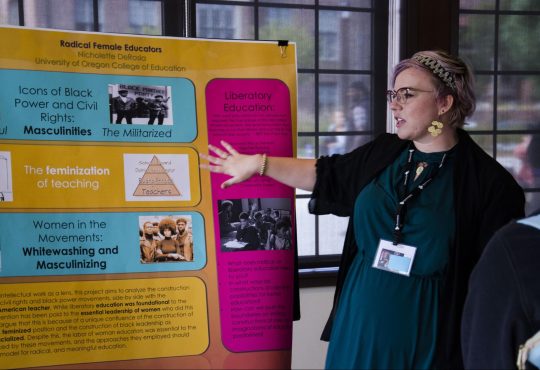
In this Age of Information, many Puget Sound students rely on their computers in and outside of the classroom: after all, computer use does increases the volume of data that we take in and it quickens the rate at which we reproduce those data or generate a response. But, these devices ultimately impair our creative capacities by forming channels of habit that make us saddeningly reliant on technology in order to interpret ideas, let alone articulate them in the first place.
Compare two forms of writing, longhand and typing. Longhand writing demands patience and fuller cognitive function, since you watch your hand move across the page, see the letters appear slowly and gracefully, and stay mindful that the script is actually legible. If you are taking class-notes, then the lecture is adapted from the oral form, delivered with changes in tone, to your script, perhaps with key points underlined.
The physiognomy of this is remarkable: when writing longhand, you actually have to draw individual letters with a constant manual gesture. Computer typing discourages such attentiveness to the act of writing—for you can listen and write simultaneously, taking down what’s being dictated instead of re-thinking what has been said. It also neglects the visual presentation of spoken information, such as drawing a bubble web on paper. The computer does allow for increased output, but the tactile connection to the data itself is lost, since “writing” just becomes the soulless pressing of keys, using less calligraphic intention and more muscle memory.
Our reliance on educational technologies causes cognitive impairment, perhaps not at the neuropathic level, but at least in terms of our ability to produce similar texts without those same devices. For example, over the course of a semester, how many of us could produce the same rich analyses and complicated arguments with pencil and paper if our enabling technologies were inaccessible?
The in-class essay might be an obvious exception to this rule, but they test immediate and not sustained or evolving knowledge, and professors often expect less from students’ extemporaneous production, the argument a student develops in class often being left there once time’s up.
Personally, my English thesis would be far less coherent than it is, and my poetry rather dim without the option to add and erase text from a blank Word document at will. My academic and creative writing are wholly subject to the computer as an extension of my cognitive abilities. Without it, I would be left to my own sense of logical argument structure, spatial awareness and memory without the organizational programs of Microsoft Office and the frightfully vast collective memory that is the Internet.
What about using technology in the classroom? In Wyatt Hall, the laptop-to-projector connection often fails, or eats up class time out of sloth. And taking notes on computers?
The rapidity is incomparable, but students can easily distract themselves without the instructor noticing. Moreover, the communicative signals of eye contact, reassurance with a nod and turning your ears towards the speaker are negated by the allures of the screen.
These dilemmas might differ from discipline to discipline. In a biology or physics lecture, for example, students sit, listen and take notes by hand to incorporate sketches and diagrams, then review those notes at a later point to prepare for a test. Do humanities students re-read their class notes, especially if the graded assignments are short and long essays instead of precise, in-class data quizzes?
We use these educational technologies for many reasons: ease, convenience and rapidity. Above all, the computer as an instrument of essay/article/lab composition and data arrangement seems to liberate the hindrances of pen and paper or chalk and board media. Because of the speed of information production, it seems as if there is a direct cerebrum-to-fingers connection, making the writing nearly automatic, as if they were dictating to your hands.
But something is lost in that automatism, in that fluidity, for the heights of intellectual achievement are increasingly arrived at only through the use of educational technologies. In the end, what does this say about us as students and thinkers, as people who try to confer upon our academic experience a degree of legitimacy through these artifacts, more digital than analogue, that we leave behind?
[PHOTO COURTESY/MARIA SOKOVA]





